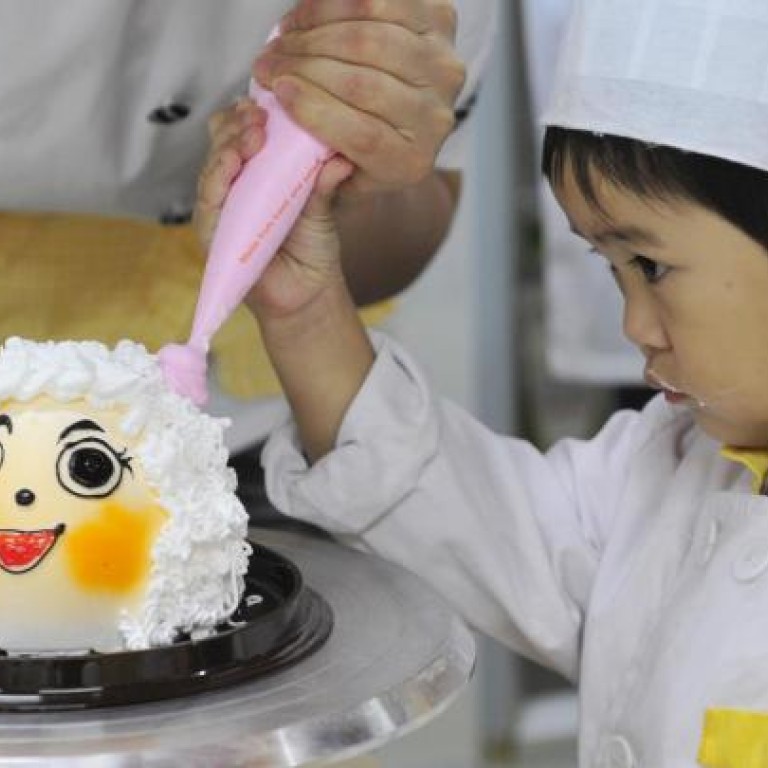
Class Action: There's a lot for little ones to learn in the kitchen
Well, to begin with anything she loves doing with you is going to enhance the work she does at school. Don't underestimate the value of talking time. Discussing what you are doing and why gives her a firmer grasp of cause and effect. It lets her see what you are thinking as you do things. This, in turn, will become part of how she expresses herself more fully, both when speaking to others and communicating in her written work.
Parents often overestimate the value of what they see written down and push writing too much. Teachers need time to help children develop how they describe their world just by talking about it. They need to learn how to express their viewpoint orally first before they feel comfortable writing it down.
Involve your daughter in following the recipe. If she is old enough to read, she can read out the ingredients to you as you put them out, or let her get them out where she is able. Then you can ask her to put them in the order used in the recipe. Always stress the importance of reading through and understanding the instructions before you begin to help her learn about planning.
Instructional texts are part of a rounded English curriculum and being able to read, understand and write one are all things she will need to know. Look at the ingredients as a shopping list and show her what you are missing and add it to your things to buy. Point out that it is good to list the ingredients first so you don't start making it and find you don't have everything. This helps her to understand why instructional texts are presented the way they are.
Talk to her about the order of the steps. What would happen if you did them backwards? Can you switch any of them around? Is there a more helpful way to structure the text? Present it as pictures? Help her to see that how you structure the text is very important.
You could also involve her in writing up your own book of favourite recipes. Later she can copy some out and still further on you can help her to create her own recipes and try them out. This will give her the chance to evaluate final products and consider changes to recipes as well as helping her to develop her confidence in trying new things and experimenting.
When she begins to adjust recipes you could look into the chemistry of cooking with her. Show her the raising ingredients in baked goods and how to adjust them carefully. Explore how the eggs in cakes puff up with air and form the pockets that make cakes fluffy. Bicarbonate needs to be used with an acid, but that can be lemon or vinegar or orange juice, giving the same recipe a different taste. Show her how the bubbles form in a glass before you start mixing it in to the cake. Give her different glasses with soda in them so she can mix different things in to see what makes the best bubbles, she may turn into a budding chemist.
Maths is of course another great benefit of cooking. Real life maths experiences can improve her concentration in class as she sees that she will need the skills for her cooking. Checking how many people a recipe serves and doubling or halving it helps multiplication and division. Checking how many millilitres in a teaspoon will help her bridge the imperial/metric divide. Teachers often set up volume activities in the classroom that are messy but invaluable. Your daughter will have already been pre-taught these things if she can pour half and whole measures for your cooking.
When planning parties or large dinners let her double the recipes for you. Even if it is planning how many slices of bread, cheese and eggs for scrambled egg sandwiches.
Ask her to estimate how many tablespoons of mayonnaise needed if each has half a tablespoon and convert that into cups! Then she can do the measuring spoon by spoon into the cup to check her answer. Always talk through her estimates with "Why do you think that?" to see what she is thinking and correct the errors in her thinking first and ask her to see if she still agrees with her answer.
Reading the scales on measuring cups and scales are excellent ways for her to improve in maths. I hope now that you know how much school work and educational value there is in cooking you two can still just relax and enjoy it together!
Kris Gienger teaches at an international primary school
